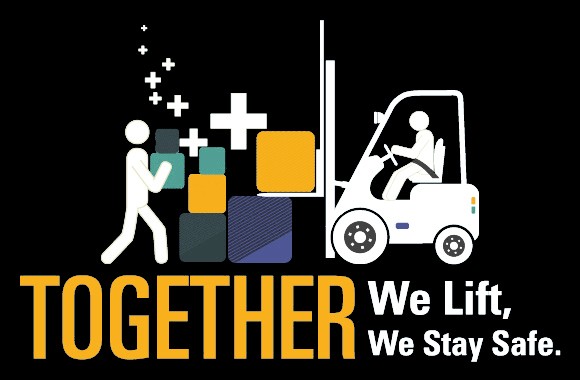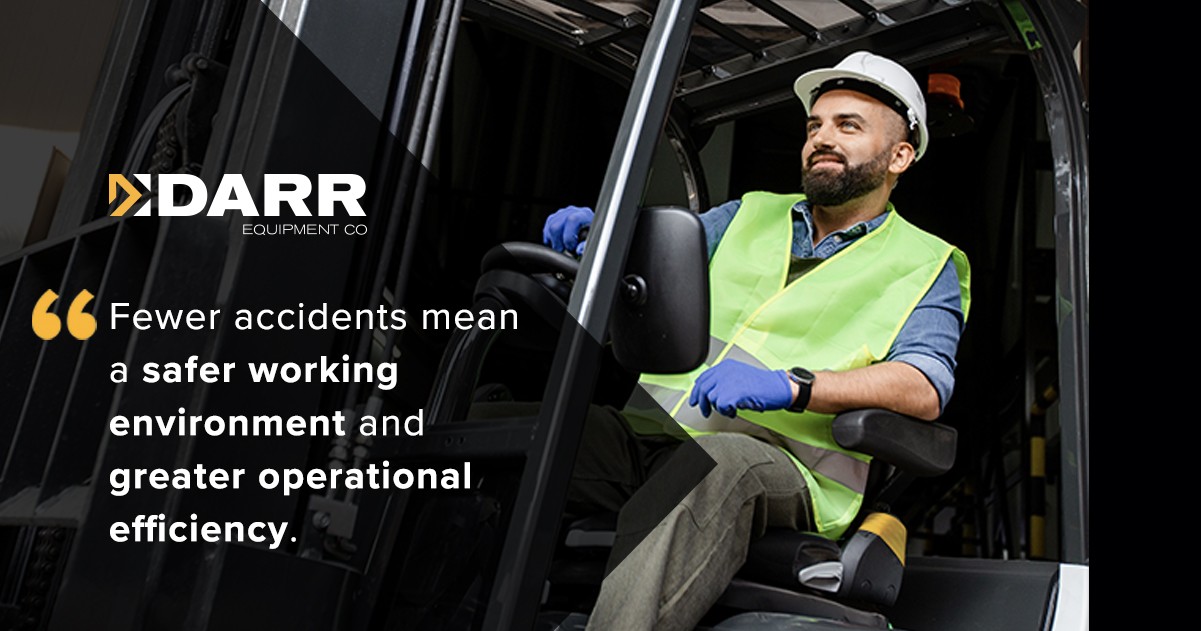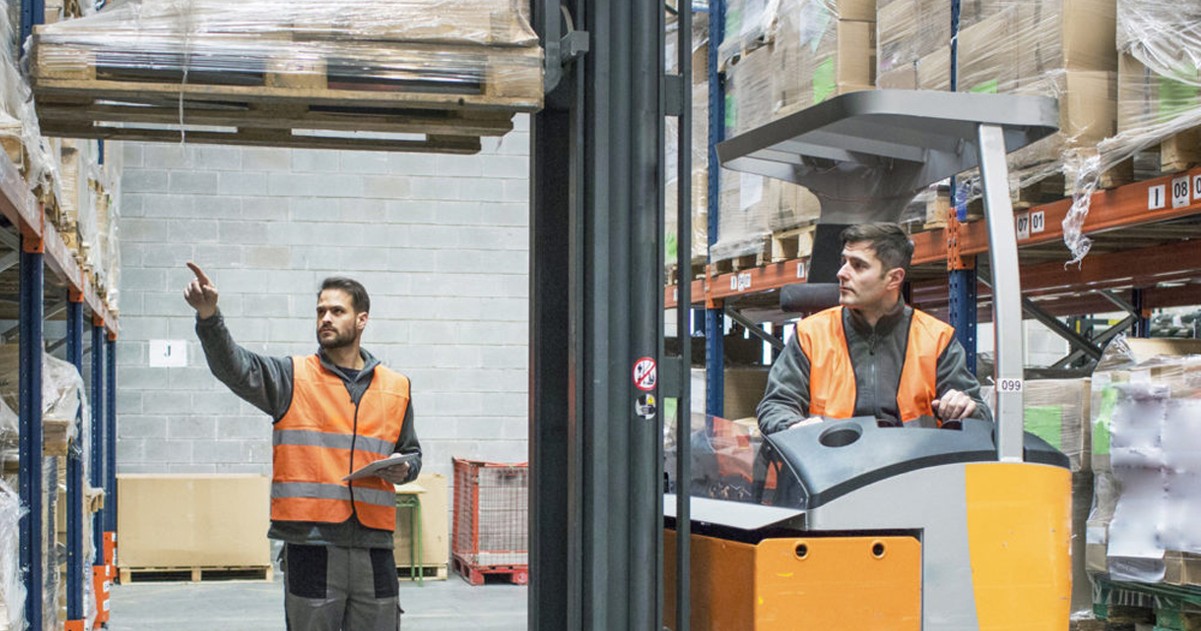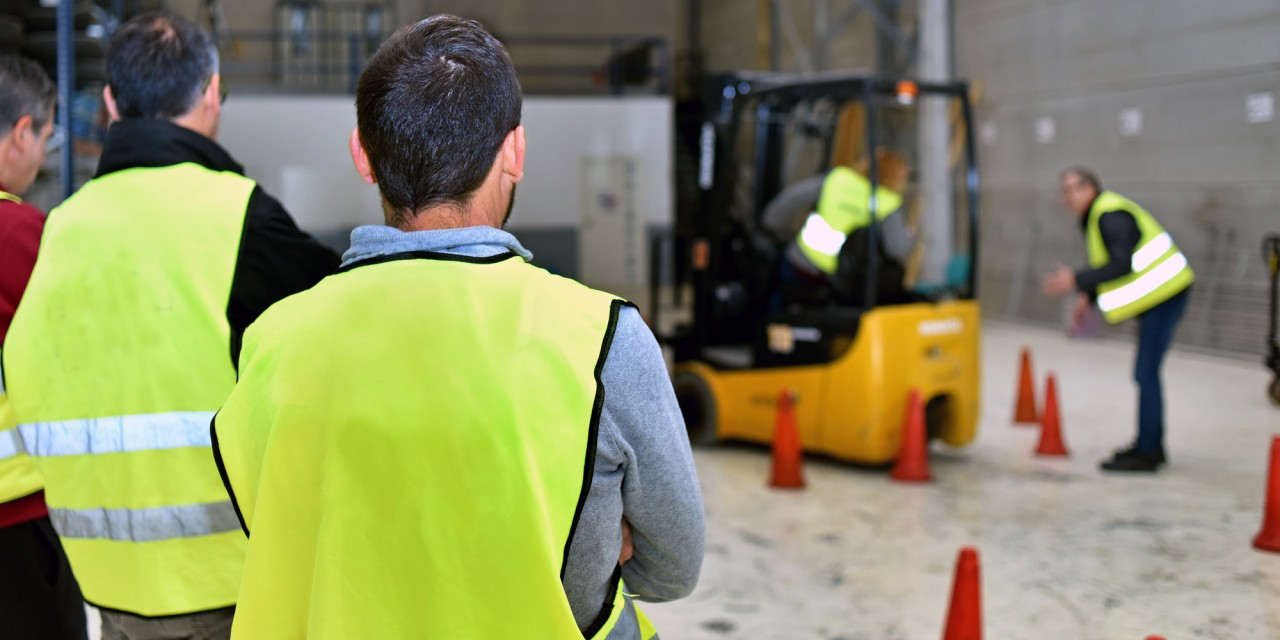Why National Forklift Safety Day Matters
Nowadays there is a national day for just about everything. So, why not a National Forklift Safety Day? Calling attention to this important topic is paramount to saving lives and reducing injuries in forklift-related accidents. To promote this crucial function in any industry that operates in a warehouse, manufacturing plant or distribution center, the Industrial Truck Association is hosting its 11th annual event on June 10 and 11 in Washington, DC. The 2024 National Forklift Safety Day will highlight forklift safety practice and policy. The Industrial Truck Industry's commitment to safe practices and to educate customer and policymakers about the safe use of forklifts and the importance of operator training are featured in the two-day sessions.
Darr Equipment and Logisnext Americas are proud to promote National Forklift Safety Day: Together We Lift, Together We Stay Safe. "We are committed to promoting workplace and forklift safety. From material handling and automation to extensive fleet support, we prioritize the well-being of everyone in and around our equipment. Join us across our leading brands: Mitsubishi forklift trucks, Cat® lift trucks and Jungheinrich® products to celebrate National Forklift Safety Day," Logisnext Americas.
The innovative tools and technology provided ensure operational efficiency. However, the forklift operators are instrumental in making it all work. The National Forklift Safety Day recognizes these experts' need for obtaining solutions that keep them working safely and efficiently. We are pleased to be able to share content such as safety tips and other information to recognize the importance of forklift safety.
It cannot be stressed nearly enough on how important warehouse or distribution center safety is. Forklift operators may be highly experienced and they may have years of working on various types of equipment. However, safety regulations change periodically and remaining in compliance is necessary to a company's success. And, what about best practices? Warehouse innovations are rapidly emerging and any industry must be cognizant of best practices in its field. Business owners and operators of all types of material handling equipment must keep up with the changes and learn from experts who have proven success rates.
The Importance of National Forklift Safety Day
As we celebrate National Forklift Safety Day, let's remember the most important reasons to do so. This special day designation assists with promoting awareness of raising the safety levels in all facilities where forklifts are operating. Ensuring that forklift operators are highly qualified and professionally trained can help reduce warehouse or distribution center accidents. As advances in forklift trucks, clamps, attachments and robotics become the norm, operators must further their education to remain essential in their line of work. It increases their opportunity to advance and feel good about their expertise and training. The return on investment is crucial for the success of the business. Fewer accidents mean a safer working environment and greater operational efficiency.
The National Forklift Safety Day event offers a framework for educating owners and operators about OSHA (Occupational Safety and Health Administration) regulations and the various state and local operational standards. Knowledge of all the compliance mandates and documentation is a huge responsibility that must be undertaken to ensure the proper equipment, procedures, and safety requirements are followed.
According to OSHA, "The warehousing and storage industry includes establishments operating facilities for general merchandise, refrigerated goods, and other products. These establishments may also provide logistical services relating to goods distribution. Potential hazards in this rapidly growing, fast-paced industry include those associated with powered industrial trucks (forklifts), ergonomics, material handling, hazardous chemicals, slip/trip/falls, and robotics. The most common injuries are musculoskeletal disorders (mainly from overexertion in lifting and lowering) and being struck by powered industrial trucks and other materials handling equipment."
Safety Matters
Boosting the morale of employees in any industry or business is extremely important to maintain success. Whether in an office setting or on a warehouse floor, each employee should be encouraged and incentivized to take pride in doing a good job. Why not recognize forklift operators on a day celebrating forklift safety? Focusing on particular individuals can encourage employee engagement and provide goodwill. Commitment to safety can be an ongoing best practice year-round.
It has been said, "You can never have too much learning". Training, education and testing the expertise of the forklift operators should occur on a regular basis. However, the National Forklift Safety Day is a good reminder to schedule ongoing safety training sessions if not already in place. All operators must be current with the latest safety protocols and how they apply to each aspect of material handling. Ensuring that each operator participates in the review of safe operating procedures or even simulated testing can assist with a reduction in warehouse floor accidents. Sessions on the use of personal protective equipment and how to respond to safety situations is an effective tool. Also, any new safety equipment can be demonstrated at the same time.
Inspections to audit the entire operating process can help with understanding the potential safety hazards that could cause accidents. Designating areas that need improvement can then benefit from an immediate creation of a safety plan to ensure a more risk-free environment. Individual material handlers and forklift operators can also be tested through hands-on demonstrations of how they operate and maintain the equipment. That will also determine who might need extra training or a review of the compliance regulations.
The forklift industry is huge. All manufacturing companies and distributors of forklifts and related equipment can contribute to the success of warehouse safety and a reduction in accidents. In participating in the National Forklift Safety Day initiative, some are offering discounts on safety equipment, safety assessments, or safety training. What better way to foster safety than to collaborate with other businesses, trade associations and regulatory groups? Spreading awareness and sharing best practices can make a lasting impression long past the National Forklift Safety Day.
As mentioned above, with new innovations in material handling, forklift safety is paramount. Trends enhancing workspace safety and efficiency include the following.
Advanced technological integration into the components of forklifts has proven to enhance warehouse safety. Features such as proximity sensors, cameras and collision avoidance systems help operators detect obstacles and prevent accidents.
Forklift manufacturers and fleet managers are increasingly utilizing telematics systems to gather data on forklift usage, operator behavior and maintenance needs. Analyzing this data can provide insights to optimize operations, identify safety risks, and improve training programs.
Virtual reality technology is being used to provide realistic and immersive training experiences for forklift operators. These simulations allow operators to practice handling various scenarios in a safe and controlled environment, improving their skills and confidence without the risk of real-world accidents.
The rise of automation and robotics in warehouses and distribution centers has led to the development of autonomous forklifts and robotic pallet jacks. These systems can operate alongside human workers or independently in controlled environments, reducing the risk of accidents caused by human error.
Forklift manufacturers are focusing on ergonomic design principles to improve operator comfort and reduce the risk of musculoskeletal injuries. Features such as adjustable seats, ergonomic controls, and improved visibility contribute to a safer and more comfortable working environment for operators.
The Accident Injury Prevention website offers these priorities for all operations involving forklifts and other material handling equipment.
- Ensure only authorized and trained employees operate the forklift. A comprehensive training course should teach: how to drive and steer; lift and deposit loads; navigate tricky areas; and operate the forklift responsibly.
- Inspect the forklift before using it to ensure it is in good working condition with no repairs required. The equipment manual will have the instructions. An inspection should be mandatory every time before use.
- Operate at a reasonable speed because the faster the speed, the greater the risk of injury. Some forklifts weigh as much as 9,000-lbs so it is imperative that they be moved by slowing down on turns and remain steady while changing directions.
- Be mindful of the workplace surroundings such as potholes, bumps, slippery floors or debris in the path of the forklift. Any of these impediments can cause injury to the operator, other workers or the equipment itself.
- Wear appropriate clothing such as: high visibility vest or jacket; hard hat; steel-toed boots; and tight-fitting overalls or jeans.
- Always load up facing the heaviest part of the forklift. For instance, when driving up a ramp, the general rule is that the heaviest end of the machine is orientated upwards. Without a load, travel up the ramp backwards. This will avoid a dangerous rollover accident.
- Always follow the proper load technique by never using the forklift tips to move a load. Lift loads above the suggested weight or attempt to use a counterweight. Loads should always be secured and attached correctly. Never load or unload goods while on a ramp.
- Be mindful of other people. Drive slowly and be attentive as the one responsible for coworkers' safety. No one must stand under a load or in any way interfere with the forklift. Communication is key to avoiding accidents.
- Avoid abrupt stops which can shift the load and cause the forklift to tip over.
- Always park at a designated spot and before leaving the forklift put it in park and turn off the engine. Inspect the equipment thoroughly before leaving it.
To wrap-up, forklift safety is crucial for preventing accidents; protecting equipment, inventory, buildings and property; maintaining regulatory compliance for safe environments and reduction in the potential to incur penalties; productivity enhancement; and reducing liability for employers. Overall, forklift safety is essential for protecting lives, property, and the reputation of businesses. It is not just about following rules; it is about fostering a culture of safety that benefits everyone in the workplace.
Remember, at all times, safety first. For more information on scheduling operator safety training contact us or request a free safety checklist.






